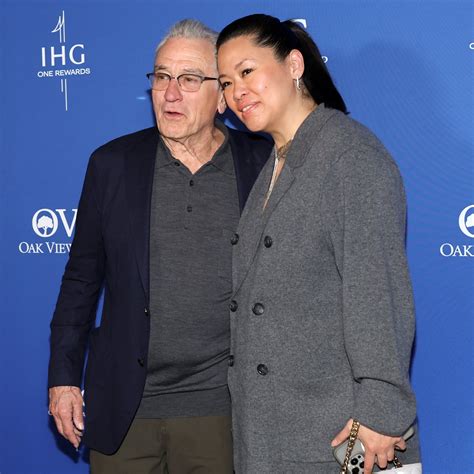
Robert De Niro is again earning accolades for his thoughtful and honest responses regarding his transgender daughter, Drena De Niro, continuing a pattern of supportive comments that have resonated with many.
Robert De Niro’s candid remarks about his transgender daughter, Drena De Niro, have once again drawn widespread praise, solidifying his reputation as a supportive and understanding parent. This recent wave of positive feedback stems from his consistently honest and heartfelt answers in interviews, where he addresses questions about his family with openness and respect.
The actor’s approach to discussing his daughter’s identity has been lauded by LGBTQ+ advocates and allies for its sincerity and lack of hesitation. Unlike some public figures who struggle to articulate their support for transgender individuals, De Niro has consistently demonstrated an unwavering acceptance and understanding of Drena’s journey. His comments reflect a deep respect for his daughter’s identity and a commitment to standing by her, regardless of societal expectations or prejudices.
This isn’t the first time De Niro’s comments about Drena have garnered attention. In previous interviews, he has spoken about the importance of supporting transgender rights and the need for greater acceptance and understanding of the transgender community. His willingness to use his platform to advocate for these issues has made him a valuable ally in the fight for LGBTQ+ equality.
De Niro’s recent remarks have resurfaced amidst ongoing debates about transgender rights and representation in the media. At a time when transgender individuals are facing increased scrutiny and discrimination, his unwavering support for his daughter serves as a powerful example of parental love and acceptance.
The response to De Niro’s comments has been overwhelmingly positive, with many people taking to social media to express their appreciation for his candor and support. Some have praised him for using his platform to raise awareness about transgender issues, while others have simply thanked him for being a loving and supportive father. His actions highlight the critical role parents and family members play in the lives of transgender individuals, offering a beacon of hope and acceptance in a world that can often be hostile and unwelcoming. De Niro’s stance emphasizes the importance of open dialogue and understanding within families when navigating issues related to gender identity.
This most recent instance of public support further cements De Niro’s role as an advocate, even if unintentional, simply by expressing familial love and acceptance in the public sphere. It underscores the significance of influential figures using their platforms to promote understanding and acceptance of the transgender community.
The actor’s repeated display of support provides a counter-narrative to the often-negative portrayals of transgender individuals and families in the media. By sharing his personal experiences, De Niro helps to humanize the transgender experience and challenge harmful stereotypes.
In essence, Robert De Niro’s honest and heartfelt responses about his transgender daughter continue to resonate with audiences, underscoring the importance of acceptance, understanding, and unwavering support for transgender individuals.
Background and Context
Robert De Niro, a legendary figure in the world of acting, is known for his iconic roles and his commitment to his craft. Beyond his professional achievements, De Niro is also a father of seven children. His family life has occasionally intersected with his public persona, particularly when it comes to his daughter Drena, who is transgender.
Drena De Niro, Robert De Niro’s eldest child, was adopted by the actor when he married her mother, Diahnne Abbott. She has forged her own path as an actress and model, appearing in various films and television shows. Drena’s journey as a transgender woman has been a personal one, and her father’s support has been a constant source of strength and encouragement.
The broader context of this news story involves the ongoing struggle for transgender rights and acceptance. Transgender individuals continue to face discrimination in many areas of life, including employment, housing, and healthcare. They are also disproportionately affected by violence and harassment.
In recent years, there has been increased visibility of transgender issues in the media, thanks to the activism of transgender advocates and the growing number of transgender individuals who are sharing their stories. However, this increased visibility has also been accompanied by a backlash from some quarters, with efforts to restrict transgender rights and roll back protections.
Against this backdrop, Robert De Niro’s unwavering support for his daughter takes on even greater significance. His willingness to speak out in support of transgender rights sends a powerful message of acceptance and inclusion, and it helps to counter the negative narratives that are often perpetuated in the media.
De Niro’s Previous Statements and Actions
Robert De Niro has a history of speaking out in support of LGBTQ+ rights. He has attended LGBTQ+ events, donated to LGBTQ+ organizations, and used his platform to advocate for equality. In previous interviews, he has expressed his belief that transgender people should be treated with respect and dignity, and he has condemned discrimination against transgender individuals.
One notable example of De Niro’s support for the LGBTQ+ community was his participation in a Human Rights Campaign video in 2016, where he spoke out against discrimination and called for equal rights for all.
In addition to his public statements, De Niro has also taken action behind the scenes to support transgender rights. He has reportedly met with transgender activists and leaders to learn more about the issues facing the transgender community, and he has used his influence to advocate for policy changes that would protect transgender people from discrimination.
The Significance of Parental Support
The support of parents and family members is crucial for the well-being of transgender individuals. Studies have shown that transgender people who have supportive families are more likely to have positive mental health outcomes and less likely to experience suicidal ideation or attempts.
Parental support can take many forms, including:
- Accepting and affirming their child’s gender identity
- Using their child’s preferred name and pronouns
- Advocating for their child’s rights and needs
- Providing emotional support and encouragement
- Educating themselves about transgender issues
- Connecting their child with transgender resources and support groups
When parents reject or invalidate their child’s gender identity, it can have devastating consequences. Transgender individuals who lack parental support are at increased risk of depression, anxiety, substance abuse, and suicide.
Robert De Niro’s support for his daughter Drena serves as an example of how parents can create a loving and supportive environment for their transgender children. His actions demonstrate that acceptance and understanding are essential for the well-being of transgender individuals.
The Impact of Media Representation
Media representation plays a significant role in shaping public perceptions of transgender people. When transgender characters are portrayed positively and authentically in the media, it can help to increase understanding and acceptance. Conversely, when transgender characters are portrayed negatively or stereotypically, it can reinforce harmful prejudices and contribute to discrimination.
In recent years, there has been a growing number of transgender characters in television shows and movies. However, many of these characters are still portrayed in ways that are problematic or inaccurate. For example, transgender characters are often used as comic relief or as objects of ridicule. They are also often portrayed as being mentally ill or dangerous.
It is important for the media to portray transgender people in a respectful and accurate way. This means avoiding stereotypes, using correct pronouns and names, and telling stories that reflect the diversity of the transgender experience.
Robert De Niro’s willingness to speak out in support of his daughter helps to challenge negative stereotypes about transgender people and promote understanding and acceptance. His actions demonstrate that transgender people are simply people, and they deserve to be treated with dignity and respect.
The Broader LGBTQ+ Rights Movement
The LGBTQ+ rights movement has made significant progress in recent decades, but there is still much work to be done. Transgender people continue to face discrimination in many areas of life, and they are often excluded from LGBTQ+ rights efforts.
It is important for the LGBTQ+ community to be inclusive of transgender people and to advocate for their rights. This means supporting transgender-inclusive policies, such as nondiscrimination laws and access to healthcare. It also means challenging transphobia and discrimination within the LGBTQ+ community.
Robert De Niro’s support for his daughter and the broader transgender community is a reminder that the fight for LGBTQ+ equality is not over. We must continue to work together to create a world where all people are treated with dignity and respect, regardless of their sexual orientation or gender identity.
The Importance of Allyship
Allyship is essential for the advancement of LGBTQ+ rights. Allies are people who are not members of the LGBTQ+ community but who support LGBTQ+ rights and work to create a more inclusive society.
Allies can play a valuable role in:
- Speaking out against discrimination and prejudice
- Educating themselves and others about LGBTQ+ issues
- Supporting LGBTQ+ organizations and causes
- Advocating for LGBTQ+ rights policies
- Creating safe and welcoming spaces for LGBTQ+ people
Robert De Niro’s support for his daughter and the transgender community is an example of allyship in action. His willingness to use his platform to speak out in support of transgender rights sends a powerful message of acceptance and inclusion.
By standing in solidarity with the LGBTQ+ community, allies can help to create a world where all people are treated with dignity and respect.
Criticism and Counterarguments
While Robert De Niro has received widespread praise for his supportive comments about his transgender daughter, it is important to acknowledge that some people may hold different views. Some individuals or groups may not support transgender rights or may believe that transgender identities are not valid.
These views are often based on religious beliefs, cultural traditions, or personal experiences. It is important to engage with these views respectfully and to try to understand the underlying concerns. However, it is also important to stand firm in our commitment to transgender rights and to challenge discrimination and prejudice wherever it exists.
Ultimately, the goal is to create a society where all people are treated with dignity and respect, regardless of their sexual orientation or gender identity. This requires ongoing dialogue, education, and advocacy.
Conclusion
Robert De Niro’s consistent and heartfelt responses regarding his transgender daughter, Drena De Niro, continue to resonate with audiences and solidify his position as a supportive and understanding parent. His willingness to speak openly and honestly about his daughter’s identity, and to advocate for transgender rights, sends a powerful message of acceptance and inclusion.
In a world where transgender individuals often face discrimination and prejudice, De Niro’s unwavering support for his daughter serves as a beacon of hope and a reminder of the importance of parental love and acceptance. His actions demonstrate that transgender people are simply people, and they deserve to be treated with dignity and respect.
De Niro’s continuous support also underscores the significant role influential figures play in shaping public perceptions of transgender individuals, reinforcing the need for accurate and respectful media representation to foster a more inclusive society.
His story, while personal, contributes to the broader narrative of LGBTQ+ rights and the ongoing struggle for equality, highlighting the crucial role of allyship in creating a world where all individuals, regardless of their gender identity, are celebrated and supported. De Niro’s actions provide a positive example for other parents and families, promoting open dialogue and understanding within the family unit when addressing issues related to gender identity.
FAQ
1. What prompted the recent praise for Robert De Niro regarding his transgender daughter?
The recent praise stems from De Niro’s consistent and honest responses in interviews when asked about his transgender daughter, Drena. His openness, acceptance, and unwavering support for her identity have resonated with many, particularly within the LGBTQ+ community and among allies. His remarks underscore the importance of parental support for transgender individuals and his willingness to use his platform to demonstrate acceptance and understanding. These supportive comments stand in contrast to the discrimination and misunderstanding that transgender people often face.
2. How has Robert De Niro demonstrated his support for his daughter Drena?
De Niro has demonstrated his support through his consistently positive and accepting comments in interviews, where he speaks openly about his love and respect for Drena. While specific details of private interactions are not publicly available, his public statements reflect a deep understanding of transgender issues and a commitment to standing by his daughter. He has not shied away from discussing her identity and has used his platform to advocate for greater acceptance and understanding of the transgender community, showcasing his support both privately and publicly.
3. Why is parental support considered so important for transgender individuals?
Parental support is crucial for the well-being of transgender individuals because it significantly impacts their mental health, self-esteem, and overall quality of life. Studies show that transgender individuals with supportive families are less likely to experience depression, anxiety, and suicidal ideation. Parental acceptance and affirmation of a child’s gender identity can provide a sense of validation and belonging, which is essential for navigating the challenges and discrimination that transgender people often face. Robert De Niro’s example highlights the positive impact of parental support and the importance of creating a loving and accepting environment.
4. What impact do media representations of transgender people have on society?
Media representations play a significant role in shaping public perceptions of transgender people. Positive and accurate portrayals can increase understanding, acceptance, and empathy, while negative or stereotypical depictions can reinforce harmful prejudices and contribute to discrimination. When transgender characters are portrayed as complex and nuanced individuals, it helps to humanize the transgender experience and challenge misconceptions. De Niro’s willingness to speak openly about his daughter helps to counter negative stereotypes and promote a more accurate and respectful representation of transgender people in the media.
5. What are some challenges transgender individuals face in today’s society?
Transgender individuals face numerous challenges in today’s society, including discrimination in employment, housing, healthcare, and education. They are also disproportionately affected by violence and harassment. Many transgender people struggle to access appropriate medical care, such as hormone therapy and gender-affirming surgeries. Additionally, they often face social stigma and a lack of understanding from family members, friends, and the broader community. Robert De Niro’s advocacy helps to raise awareness about these challenges and promote a more inclusive and equitable society for transgender individuals.









